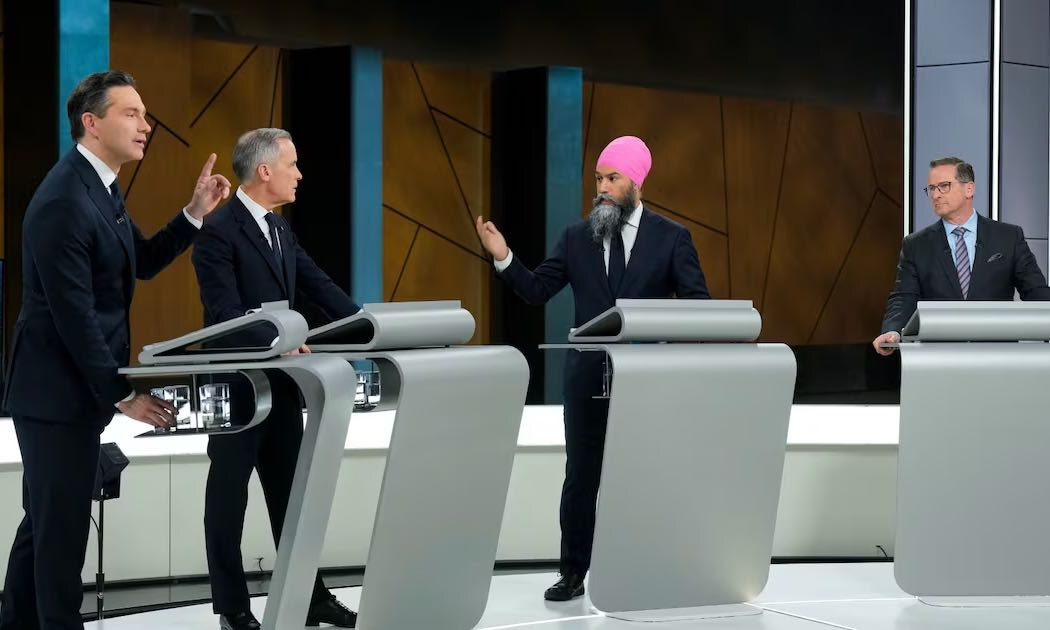The Media Becomes the Story
The weekend was filled with some long lineups at advance polls for next Monday's federal election. On Good Friday, around two million people voted, a single-day advance poll record.
It was just another piece in the puzzle of what has turned out to be a very different election, strongly influenced by what has been happening in the US.
It's also been an election the news media has taken centre stage for and like many other things about this election, that doesn't make sense either.
A Very Different Election
Next to the leaders and their policies, the role of the news media has arguably become the biggest election sidebar item in this campaign. I’ve watched elections since the 1970’s and can’t remember an election where there’s been so much debate about the media. This is a very different election and not just because the biggest issue is what’s going on in another country.
The strange thing is, reporters are just trying to do their jobs and cover a federal election as they have for generations.
It all started at about the same time the April 28 election was called when Conservative Leader Pierre Poilievre announced reporters would not be welcome on his campaign plane. Not a big surprise because Poilievre and mainstream media types have been like oil and water for years. Having reporters from Canada’s biggest media outlets tag along has been seen as a good thing in politics. Over the years, impromptu media scrums on planes with party leaders have created good copy and some great sound bites. Smart party leaders have turned the media throng to their advantage.
By the way, mainstream media outlets were not getting a freebie. They pay going rates to fly with party leaders. By tagging along a lot of time is saved booking separate flights and ground transportation. It just makes it easier for the TV networks and big newspapers.
When the campaign did start, Poilievre implemented a practice of only taking questions from four media outlets. They were identified before the newser and had to submit questions in advance. This isn’t proper journalism and on top of that, some of the media outlet choices made by the Conservative party were, shall we say, a little bizarre. Over the weekend when Poilievre was in Vancouver, one of the four calls taken came from a local radio station in Manitoba.
Then when the campaign started it became clear that Prime Minister Carney was sometimes shielded from the media, even at events where he was making campaign announcements. Although not nearly as restrictive as the way the Conservatives were handling the media, the Liberals weren’t exactly free and easy with media access to the PM.
Last week when the televised debates were held, the Debates Commission (yes there is a group that makes rules for debates during federal elections) was forced by earlier court decisions to allow right-wing media outlets like Rebel News and True North to participate. To no surprise, Rebel and True North made lengthy monologues instead of asking questions at the post-debate media scrum. When they finally did get around to asking questions, they included ones like “How many genders are there in Canada?” Things went so poorly in the French debate, pundits were calling for everyone on the Debates Commission to get fired.
The following night as the English language debate was going on, the Commission quietly announced the usual post-debate scrum with the party leaders had been cancelled due to “security concerns.”
No Comment
It goes even deeper. The Conservatives, and sometimes even the Liberals seem to have placed media gag orders on local candidates across the country. On several occasions I’ve seen media outlets report they asked for a comment from a local election candidate but never got a call back, or were referred to a talking head with the party’s organization. It's actually been rare to see a Conservative candidate do a local media interview.
One would think local candidates would be trying to create a positive difference between themselves and their riding rivals. You would think seeing a candidate in your riding talking about the important issues of the campaign would be a good thing.
Apparently not.
It’s clear the parties are worried about the downside of media interviews for their candidates. They’re obviously worried their candidate will say something stupid, costing not only the candidate at the polls, but also their party.
Keep in mind many candidates were dropped into ridings at the last minute and likely didn’t get media training, or if they did, haven’t had the chance doing many interviews. A smart reporter doing his or her job would likely get a juicy quote or two from a “deer in the headlights” local candidate.
I’m also sure there’s research showing only a small percentage of Canadians cast their votes solely on the strength of the local candidate. As a result, there’s very little upside to having them speak to the media.
As Dull as Dishwater
What we’re left with is what we’ve got – a dull election campaign. One that’s sanitized.
There have been few surprises, few gaffes and the Liberals and Conservatives are delivering the campaigns they’ve orchestrated. Leaders make policy promises, take a few questions from reporters, shake some hands with the common folk at the event and then it’s on to the next campaign stop.
Wash, rinse, repeat.
On evening TV newscasts, we see leaders make the announcements and only occasionally have to answer difficult questions from reporters. That’s textbook stuff for political campaigns. Get your messages out to the masses through the media without facing difficult questions regarding details of the announcement.
It’s perfect. Perfect for the party, not voters.


Commentary